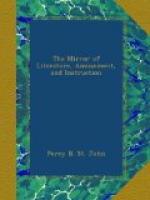After residing nearly three years in Edinburgh, Campbell quitted his native country for the Continent. He sailed for Hamburgh, and there made many acquaintances among the more enlightened circles, both of that city and Altona. At that time there were numerous Irish exiles in the neighbourhood of Hamburgh, and some of them fell in the way of the poet, who afterwards related many curious anecdotes of them. There were sincere and honest men among them, who, with the energy of their national character, and enthusiasm for liberty, had plunged into the desperate cause of the rebellion two years before, and did not, even then, despair of freedom and equality in Ireland. Some of them were in private life most amiable persons, and their fate was altogether entitled to sympathy. The poet, from that compassionate feeling which is an amiable characteristic of his nature, wrote The Exile of Erin, from the impression their situation and circumstances made upon his mind. It was set to an old Irish air, of the most touching pathos, and will perish only with the language.
Campbell travelled over a great part of Germany and Prussia—visiting the Universities, and storing his mind with German literature. From the walls of a convent he commanded a view of part of the field of Hohenlinden during that sanguinary contest, and proceeded afterwards in the track of Moreau’s army over the scene of combat. This impressive sight produced the Battle of Hohenlinden—an ode which is as original as it is spirited, and stands by itself in British literature. The poet tells a story of the phlegm of a German postilion at this time, who was driving him post by a place where a skirmish of cavalry had happened, and who alighted and disappeared, leaving the carriage and the traveller alone in the cold (for the ground was covered with snow) for a considerable space of time. At length he came back; and it was found that he had been employing himself in cutting off the long tails of the slain horses, which he coolly placed on the vehicle, and drove on his route. Campbell was also in Ratisbon when the French and Austrian treaty saved it from bombardment.




